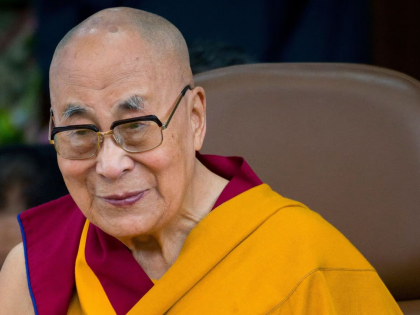"We Tibetans became refugees in our own country, but in India we have freedom": Dalai Lama
By Lokmat English Desk | Published: December 14, 2023 12:57 PM2023-12-14T12:57:52+5:302023-12-14T12:59:00+5:30
The revered Tibetan spiritual leader, the 14th Dalai Lama, arrived at Siliguri's Sed-Gyued Monastery on December 14 to deliver ...

"We Tibetans became refugees in our own country, but in India we have freedom": Dalai Lama
The revered Tibetan spiritual leader, the 14th Dalai Lama, arrived at Siliguri's Sed-Gyued Monastery on December 14 to deliver profound teachings to his devoted followers. The monastery, abuzz with preparations, witnessed the esteemed Buddhist spiritual leader's visit after a significant gap of 13 years. This visit followed a three-day tour of Gangtok, the state capital of Sikkim.
Speaking to ANI, the Dalai Lama expressed sentiments about the Tibetan plight, stating, "We Tibetans became refugees... In our own country, there is a lot of control, but here in India, we have freedom."
The spiritual leader is scheduled to deliver a two-hour-long teaching on Bodhicitta, delving into the core principles of Buddha and imparting thoughts that contribute to inner peace. The teachings carry profound significance, attracting around 20,000 devotees from diverse regions, including Darjeeling, Kalimpong, Dooars, Assam, Bihar, Sikkim, Nepal, and Bhutan.
The Dalai Lama's teachings in Gangtok drew an estimated 30,000 devotees at Paljor Stadium, where he expounded on Gyalsey Thokme Sangpo's 37 Practices of Bodhisattva ('Laklen Sodunma') and the ceremony of the generation of Bodhichitta ('Semkye'). The 37 Practices of a Bodhisattva, an ancient text from the 14th century BCE by Tokme Sangpo, encourages continuous mindfulness and alertness for the well-being of others.
The Dalai Lama concluded the session with a prayer, invoking Avalokiteshwara, for those who lost their lives in the recent flood disaster in Sikkim. He emphasized compassion, nonviolence, and the universal responsibility for the peace and happiness of the people in Sikkim and neighbouring regions.
Open in app